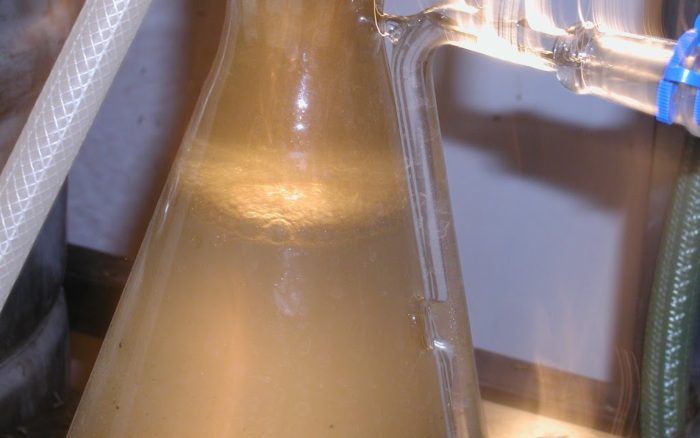Distillation and Donald
Lavender distillation has begun on our ranch! We distill in very small batches, which inadvertently has allowed us to discover that each piece of earth growing lavender has its own terroir, its essential oil distinct and unique.
The following is an excerpt from my book Farming Soul: A Tale of Initiation. It describes the process.
For thirteen days each July, my husband Donald spends almost every waking hour in a small trailer on our property distilling the lavender that we grow on our Biodynamic© organic ranch in the Napa Valley. Distillation and DonaldEarly each morning, our ranch manager Natalio, who has tended the plants for nine years now, cuts the stems short so Donald has mostly flower heads, bundles them in bed sheets, and loads them onto a wagon that he pulls with a four-tracks motorcycle to a canopied area in front of the trailer. Here Donald weighs the bundles and then loads the flower heads into a large converted beer keg still with a little water in the bottom. A turkey cooker serves as the heat source. After about forty-five minutes, the still’s copper coils begin to condense the liquid into drops that collect in a large glass flask. The oil rises to the top, the hydrosol settles to the bottom. Each batch takes about two-and-a-half hours to complete.
In this way, Donald extracts the essence of lavender. The oil is thick and slightly yellow, the hydrosol clear. There is an argument among organic growers: Is hydrosol a byproduct, only water, or a product in itself ? I can tell you for certain that it is a product. We distill it to a pH of 4.1, on the acidic side, making it particularly good for use in skin products and giving it a long shelf life if stored in the cool dark. The hydrosol holds the water soluble components of lavender as well as dispersed molecules of the oil.
The essence of lavender is a balance of opposites, operating on our nervous system as a tonic and a relaxant. The beauty of it is that neither is forced on you. Your body decides which it needs and uses the essence accordingly.
Distillation is a “slow, philosophic, and silent occupation,” wrote chemist and philosopher Primo Levi, “which keeps you busy but gives you time to think of other things . . .” (Levi 1984, 57).
“When you set about distilling,” Levi says, “you acquire the consciousness of repeating a ritual consecrated by the centuries, almost a religious act, in which from the imperfect material you obtain the essence, the usia, the spirit . . . purity is attained, an ambiguous and fascinating condition . . .” (Levi 1984, 58).
While Donald is distilling, I take him food and wine. I find him either reading Kant or in contemplative dialogue with the eighteenth century philosopher. I carry the food in a basket, through bay forest and woodland oaks, and then through the sea of unharvested lavender to the little trailer near the road. As I unpack the wine glasses and the supper, he wakes as if from a dream. He tells me that he has empathy with Kant’s dilemma about carrying a cultural projection of being an exceedingly rational individual.
“Yet this is not so!” he tells me. “Jung and Kant are not in significant disagreement,” he continues. “Both are telling me there is present a feeling function in the natural state of our philosophical and psychological being. Kant allows me to know that although my thinking is most apparent, to the dismay of some of my children and stepchildren, my feeling function is still present, just not, so to speak, ‘up front.’”
As I pour him wine, he continues with the thoughts he is distilling along with the lavender. An architect and geometer by profession, his thinking has a spatial orientation. “You and I are not just thinking/feeling, sensation/intuition opposites,” he says, “but geometrically adjacent, with significant overlap.” He says that Jung and Kant help him understand this. We are not on a right/wrong axis; we just come from very different perspectives. His eyes sweet and smiling, he adds, “As Kant put it, I should not dismiss any one as wrong because, in doing so, I might throw out that portion I love most.”
I adore this man. I pour him more wine and we eat, steeped in the essence of lavender.
This first appeared in Jung Journal: Culture & Psyche, Volume 3, Number 3, pp. 44–46.
